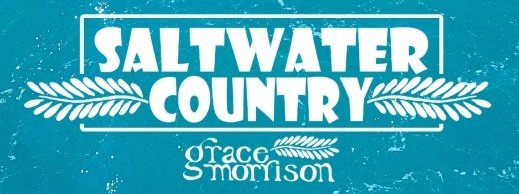
About Grace
If nerditude had a formal name, it would be Grace Morrison.
She’s a little bit of everything—pianist, accordion player, Renaissance Faire performer, cranberry grower, reader of historical nonfiction, coffee devotee (she sells her own coffee blend), and an unapologetic expert on all things New England. And somehow, all these quirks weave seamlessly into the fabric of her music, making her one of the most unique and endearing songwriters around.
Born and raised on the shores of Cape Cod, Grace Morrison has trademarked a sound she calls Saltwater Country. “I was always too pop for folk and too folk for country. Eventually, I started peeling back the layers of my music to find out what truly made it mine. At the heart of it all was my deep, undeniable connection to the Cape Cod coastline—it’s in my blood, in my voice, in every lyric I write. My music carries the storytelling of country, the twang, but also the raw, unshakable spirit of a Swamp Yankee. That’s Saltwater Country.”
Proudly unconventional, she’s never held what some would call a "real job." She says “it’s always been music and how lucky am I that music has given me this wild, unpredictable journey through the human experience. I wouldn’t trade that for anything.”
Her career started when she was in high school playing at coffee shops, where she sang for tips—one of which came from none other than actor James Spader. “I still have the $20 he left me,” she laughs.
Not long after, she hit the road with Rock 4 Xmas, sharing the stage with legends like Eddie Money, Joey Molland (Badfinger), Carmine Appice (Vanilla Fudge, writer of Da Ya Think I’m Sexy), and Greg Douglass (Steve Miller Band, co-writer of Jungle Love).
“I was 17, on a tour bus with rock icons. You can’t ask for a better crash course in rock ‘n’ roll than that. I could tell you some stories,” she says with a knowing grin. “It was Spinal Tap in real life—literally, someone from that movie was on the tour. But for me, the biggest thing was realizing that this life—touring, performing—was possible. All I’ve wanted since then was to get back on that bus.”
In those early years, she struggled to define her own sound. “My dad was convinced I should be a blues singer—like he hadn’t even heard my voice,” she jokes. “It took time, but I finally figured out who I am as an artist. And that’s Saltwater Country.”
One of the defining moments in her journey came when she collaborated with hit songwriter Lori McKenna. “I was eight months pregnant when Lori invited me to write with her. We wrote Just Loving You, and it was the most personal thing I had ever written. The way it connected with audiences—it was something I had never experienced before. I learned that the more personal and specific my songs are, the more they seem to resonate. You’ve got to write what you know.” Saltwater Country, the album, is a testament to that.
Saltwater Country takes the old adages of “3 chords and the truth” and “don’t bore us, get to the chorus”, wraps them up with a 90’s pop bow, and leaves the listener with a sound that is at once new and familiar.
Produced by Jon Evans (Tori Amos, Sarah McLachlan), the album ranges from the gritty, swampy Poor Man’s Daughter—a raw reflection on growing up with nothing—to the fun, twang-filled Beer in a Teacup, an anthem about embracing imperfections and letting self-doubt roll off your shoulders.
It’s the sound of an artist who’s found her confidence, embraced her quirks, and learned that sometimes, when life gets messy, you just pour your beer in a teacup and move on.
“She is folk. She is pop. She’s unbelievably masterful behind the wheel of a guitar. Morrison’s vocal storytelling can make you cry; it can make you sing.”

